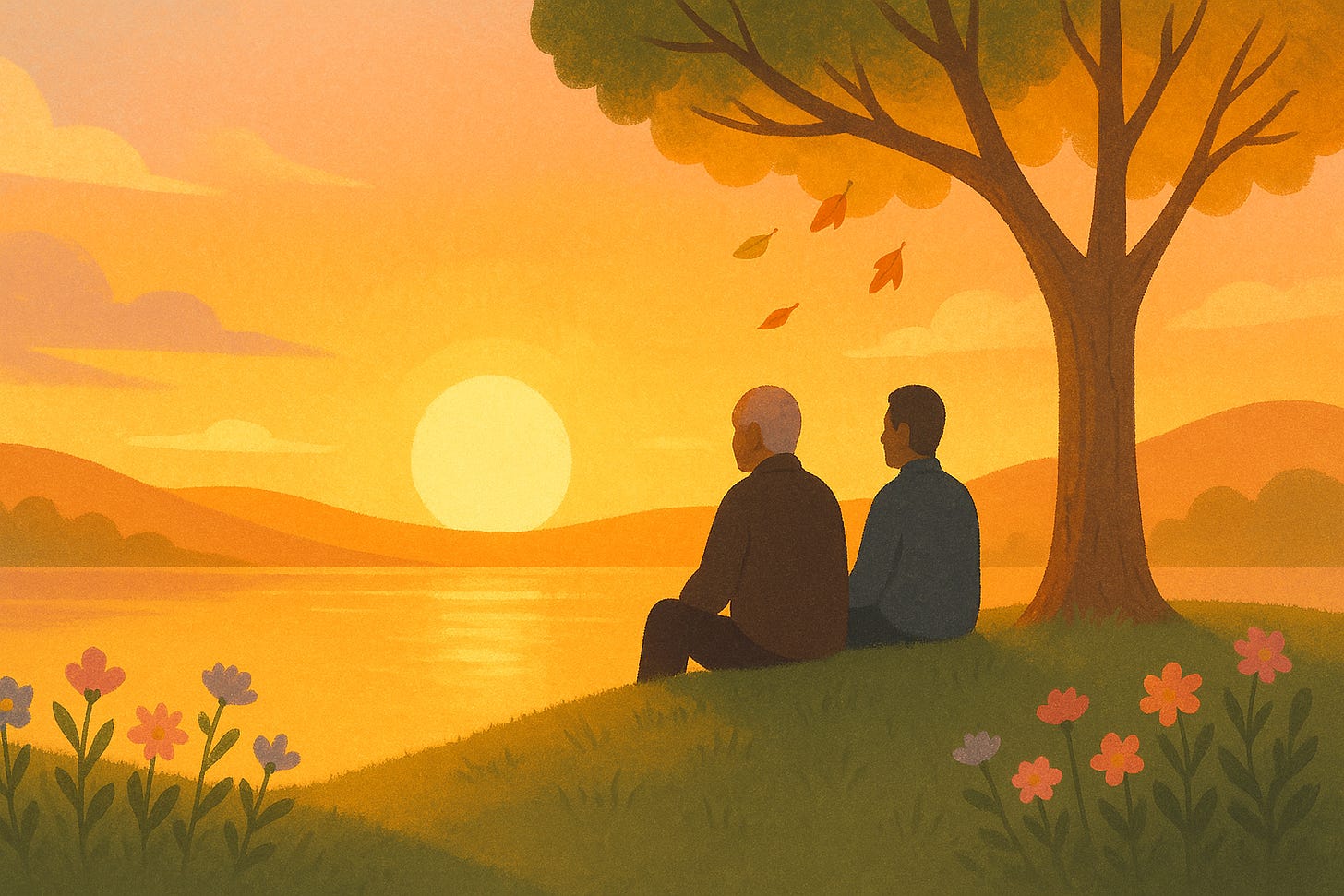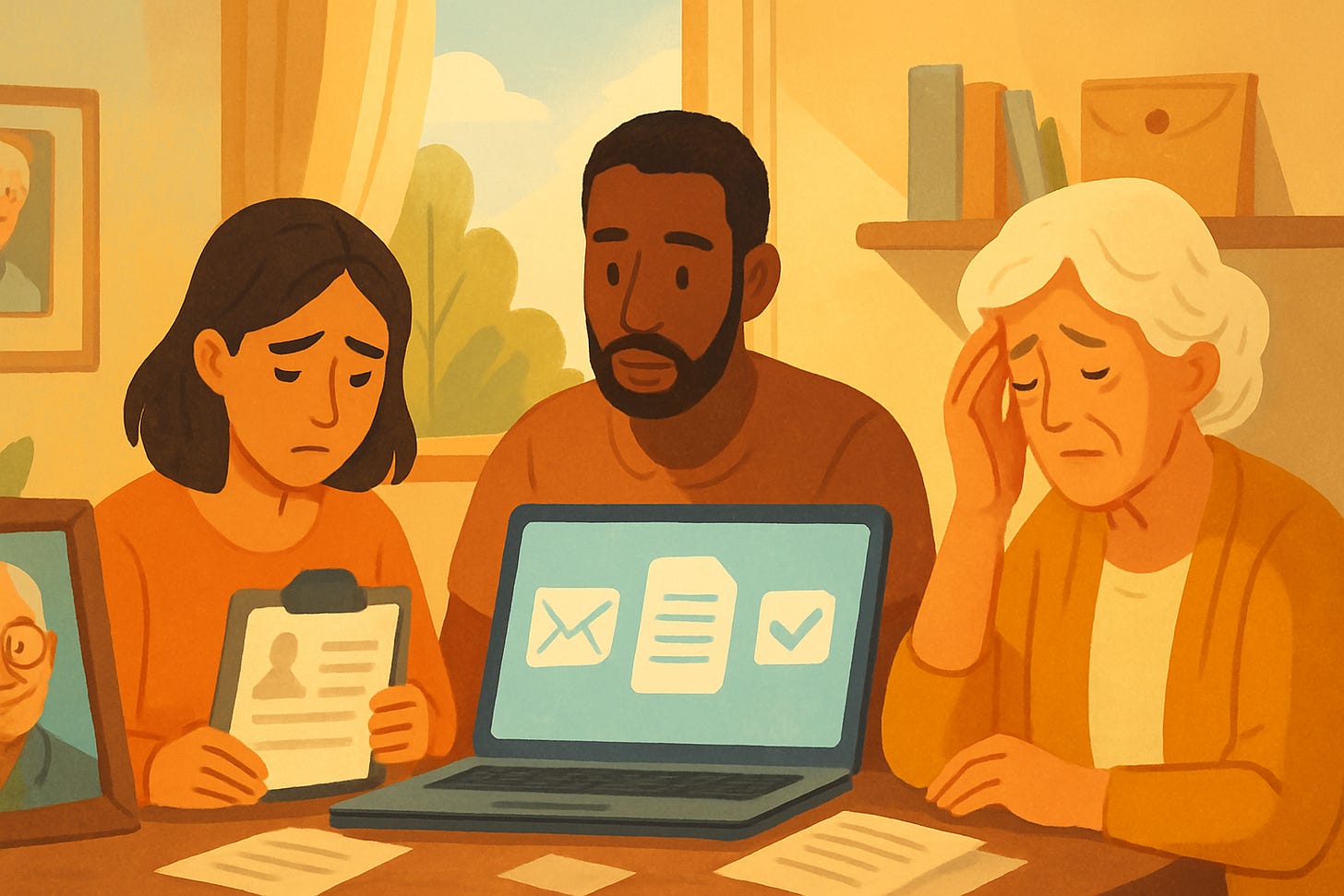How to not die like a coward
Guest post from an expert
When I taught Adulting 101 at Boston College, there was one topic on the syllabus the students dreaded: “Death”. Yet, at the end of the semester, it was consistently cited as one of their most meaningful learning experiences.
I am not an expert on death, but thankfully… I am married to one. This post was written by my wife, Charlotte Grinberg.
Charlotte has worked as a doula (for birth), an internal medicine doctor (for all ages), and a hospice medical director (for end-of-life). When it comes to the challenges, and the miracles, our bodies offer us, she really has seen—and helped people through—it all.
Note: This title was my choice. Too many people fear death, despite its inevitability, and that fear manifests in poor life choices. The goal here may not be to *embrace* death, but at least to accept it—and at best, to have it be a motivator.
Raffi is married to me, and I’m a hospice and internal medicine physician. He has gracefully stood by my side at dinner parties while I introduce myself as an end-of-life care doctor—and the room goes completely silent. People are either thinking, “I don’t want to think about that,” or “I don’t know how to talk about that,” or they’re remembering an experience they don’t want to relive.
Death is the part of the life cycle most wrapped in taboo, fear, and avoidance. And yet, there is no more universal experience. I’m here to tell you: death doesn’t have to be something we ignore. It’s an opportunity for growth and connection. Here are three things I’ve implemented to help me live adulthood with much more meaning and gratitude.
1. Spend time thinking about how you—and your loved ones—are going to die
Mortality rates have never been lower in human history. We should feel profoundly lucky. Most people now survive childhood, childbirth, and infections that once devastated families. But that progress comes with a side effect: many of us go decades without witnessing death up close. This lack of exposure creates the illusion that death is distant or avoidable. It isn’t. We will all die. It’s a natural, inevitable part of the life cycle.
Given the lack of personal life experiences (and the lack of accurate portrayal in wider culture), I think at the very least we need to spend some time visualizing and internalizing that we and the people we love are going to die. Because death is so unpredictable, I don’t focus on the specifics... but I do lean into the recognition of death.
If you haven’t stopped reading this post yet, I’m proud of you! Being realistic about death should not be equated with pessimism. If you know me, you know how hopeful and optimistic I am. I use a simple grounding practice during social interactions. “This could be the last time I see this person.” It reminds me that this time together is special. That awareness helps me prioritize presence, reconciliation, and closeness.
2. Talk about death early and often
Talking aloud with others helps with normalization. In our house, it’s completely ordinary to say things like “when I die” or “when you die.” We talk about death the way we talk about taxes or unloading the dishwasher. Even our young kids are comfortable with these conversations. I’ve talked with Raffi about what I hope for him in life and our children if I die earlier than expected. I’ve talked about what levels of physical and mental incapacity seem ok to me, versus which are not. These conversations aren’t one-and-done, of course; they evolve as life changes.
Not having an informed health care proxy often leads to overmedicalization (intubation, resuscitation, artificial nutrition)—prolonged, painful interventions that the person might never have wanted. Family members, paralyzed by uncertainty, sometimes default to “do everything medically,” not out of hope, but out of fear. I’ve seen too many families spiral into guilt, confusion, or bitter conflict because they didn’t know what their loved one wanted.
Someone told me she hasn’t talked to her brother in over a decade because they disagreed about cremation versus burial for their mom—because the mom had never told them what she wanted while she was still alive.
You can prevent this! Talk honestly. Be specific. And if you want to go one step further, write a letter or record a video to guide your loved ones. Mine includes this:
“Please be free of any guilt, regret, or worry. If I were alive and awake and able to communicate I would tell you that you have done too much for me. And when you think of me please let it always be in celebration.”
People crave three things at the end of life:
Direction
Reassurance
Connection
A few honest words can offer all three.
3. Get your end-of-life financial and legal logistics in order
One of the worst situations you can leave your loved ones in is a digital and legal mess. I’ve seen families spend hundreds of hours sorting through accounts, documents, and to-do lists—right when they’re supposed to be grieving.
In fact, I think most people don’t end up processing and grieving deaths because they are instead drowning in paperwork and logistics. So many people tell me they have not yet processed the death of a loved one they experienced even over a decade ago.
Here’s a short list that will prevent 80% of the chaos:
Add beneficiaries to all your bank accounts.
Store your passwords in LastPass (or a similar manager) and set up emergency access.
Make a will — it doesn’t have to be fancy or expensive (you can use freewill.com).
Appoint a healthcare proxy and make sure the paperwork is notarized, signed, and dated—because any error makes it null! (Note: This is different than a power of attorney, which is for financial and legal decisions.)
If someone is nearing the end of life, help them make funeral arrangements including payment in advance.
Sites like Cake offer free step-by-step tools for this kind of planning; so does The Conversation Project.
I promise you—as someone who interacts with people every day who assume all this paperwork was done (but it wasn’t) and thought they had more time to have these conversations (but they didn’t)—there is no time like the present to do this for your parents and for yourselves.
I’ll never forget when someone told me: “My entire 20s and 30s were just consumed with dealing with the aftermath of my dad’s death from a financial, legal, and family drama perspective. It was my second full-time job.”
There can be so much wisdom, connection, and personal growth from the dying process. I hope these tools can set you up to appreciate this inevitable part of the life cycle.




Excellent information.
Thanks for sharing. I lost my dad before I met my husband, who has now passed as well. My mother and I often talked about what she wanted since losing her husband so young. My husband thought it was weird that we did such. He had yet to lose anyone close to him. Then he got sick, and we had to start discussing his wishes. We preplanned and prepaid for things so we would not have to "stick" any family members with blindly trying to figure it out.